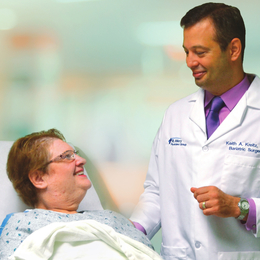
On a Mission to Better Health: Bariatric and Metabolic Surgery Options
The bariatric and metabolic surgery options at St. Mary Medical Center offer a path to better health.
It's been described as an epidemic in the United States: being obese. If you are more than 100 pounds over your optimal weight, the health risks are especially serious. Bariatric and metabolic surgery can change people’s lives.
Bariatric surgery helps people gradually lose weight in two ways: first, by restricting the amount of food that can be eaten; and second, by decreasing the number of calories consumed each day. In addition to substantial weight loss, bariatric surgery helps reduce or eliminate many obesity-related health problems and metabolic disorders, including diabetes, high blood pressure, heart disease, sleep apnea, and joint pain.
Preparing for a Bariatric Procedure
If you are considering bariatric surgery, you can generally expect three to six months of in-depth medical evaluations, as well as extensive education about the medical, nutritional, and behavioral aspects of surgical weight loss, leading up to a scheduled surgery date. In addition, patients and family members attend support group meetings.
Before surgery, you will receive a private consultation with a bariatric surgeon and have a comprehensive physical examination to identify any medical conditions that may affect the surgery and its outcome. You also will have a psychological and nutritional assessment to determine if you are ready to make the permanent lifestyle choices needed to lose the weight and keep it off.
Bariatric teams include experienced, board-certified bariatric surgeons, specially trained nurses, registered dietitians, and exercise and physical therapists. Each plays an important role in helping you achieve your weight-loss and healthy-living goals.
Minimally Invasive Options
When surgical techniques are minimally invasive, they typically mean less pain, a shorter hospital stay, and quicker recovery time after surgery. Some procedures may be performed using a robotic surgical system.
There are a few different options for bariatric procedures, including:
* Sleeve Gastrectomy: This is one of the most common procedures performed. A thin sleeve of the stomach is preserved and the rest of the stomach is removed. The sleeve is about the size of a banana and limits the amount of food that can comfortably be eaten, which results in fewer calories being consumed.
* Roux-en-Y Gastric Bypass: This procedure is typically performed using laparoscopic tools inserted through small incisions in the abdomen. Gastric bypass surgery creates a smaller stomach and allows food to bypass the first part of the small intestine. This results in fewer calories being consumed, and in fewer calories being absorbed.
* Dual-Balloon Nonsurgical System: The dual balloon is an FDA-approved device that, by taking up room in your stomach, creates a feeling of fullness and helps you feel satisfied with less food. This procedure places two connected, medical-grade saline-filled balloons inside the stomach for a period of six months. The dual balloon comfortably conforms to the shape of the stomach and has a safety feature that prevents deflated balloons from passing into the intestines.
Online Resources to Help You Succeed
The St. Mary Bariatric and Metabolic Surgery Program offers information and resources online at www.stmaryhealthcare.org/bariatrics, including:
* Virtual information session: Watch me offer an overview of the program, its components, and procedures available.
* Request an appointment: Fill out a form online, and a member of the Bariatric and Metabolic Surgery Team will contact you to schedule an initial consultation.
* Register to attend free informational sessions: These in-person informational sessions can help you get answers to all your questions.
Is Bariatric Surgery an Option for Me?
If you can answer “yes” to any of these questions, the St. Mary Bariatric and Metabolic Surgery Program may be right for you:
* Are you 100 pounds or more over your ideal weight, or have a body mass index (BMI) of 40 or greater?
* Is your BMI over 35, and do you have other chronic health conditions such as high blood pressure, diabetes, or high cholesterol?
* Have you been unable to lose weight and keep it off, including efforts through medically supervised programs?
* Are you committed to permanently changing your eating and exercise habits?
For more information or to schedule an appointment with Dr. Kreitz, call (215) 710-5711.
Photograph courtesy of St. Mary Medical Center


